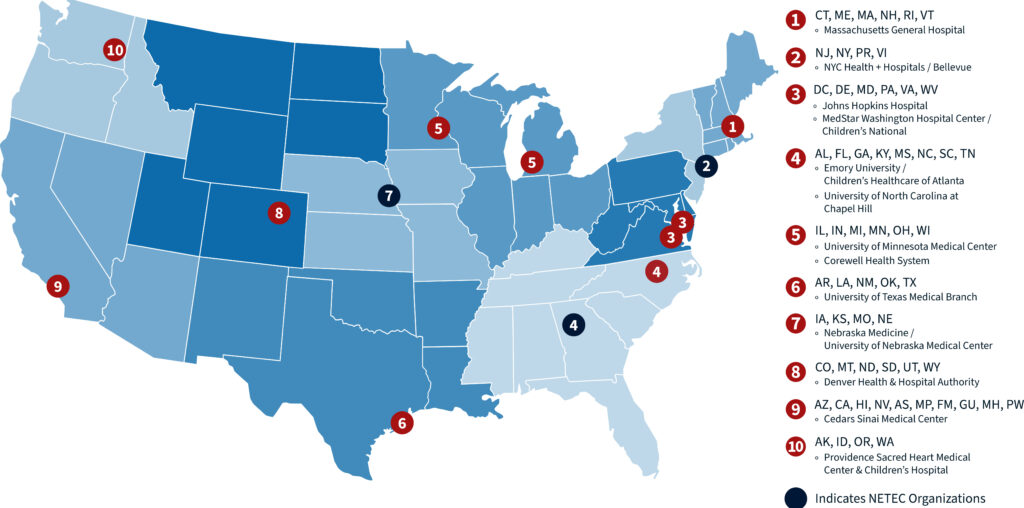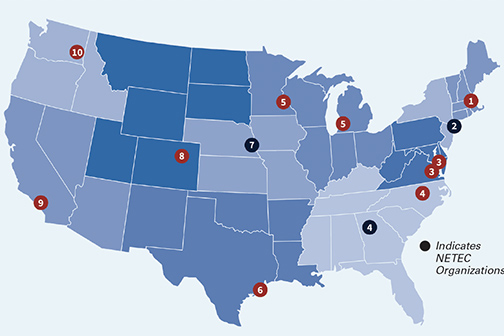It’s been a decade since the World Health Organization declared the Ebola outbreak in West Africa a public health emergency.
That emergency, and Nebraska’s response to it, laid the groundwork for the National Emerging Special Pathogens Training and Education Center (NETEC), now approaching its 10th anniversary.
In early 2015, the Administration for Strategic Preparedness and Response and the Centers for Disease Control and Prevention asked the three United States organizations that successfully cared for patients with Ebola — UNMC and Nebraska Medicine, Emory University and NYC Health + Hospitals/Bellevue — to form the National Ebola Training Education Center.
“The focus was on education and training,” said Shelly Schwedhelm, associate director for clinical operations and emergency management at UNMC’s Global Center for Health Security. “We wanted people to be knowledgeable, informed and able to create safe practices for their work environment if cases kept coming.”
Since then, NETEC’s role has evolved, including its name — NETEC now stands for the National Emerging Special Pathogens Training and Education Center. The name change took place in 2019, taking lessons from the Ebola response and applying them broadly to prepare for other emerging special pathogens.
“The scope and mission of the center also expanded,” said John Lowe, PhD, director of UNMC’s Global Center for Health Security and NETEC co-PI along with co-PIs at Emory University and New York Health and Hospitals Corporation. “NETEC developed a national research network for rapid clinical research, activities and tools to assess special pathogen readiness across the nation and convened international partners to advance global readiness.”

This paid dividends when Nebraska and Regional Emerging Special Pathogen Treatment Centers (RESPTs) across the nation were thrust to the forefront in the nation’s response to COVID-19.
UNMC and NETEC collaborators leveraged NETEC training and programming to rapidly respond to COVID-19.
At UNMC, Dr. Lowe and Joshua Santarpia, PhD, did the first testing that showed this was an airborne pathogen; the team did research validation on the N95 disinfection strategy with ultraviolet radiation; the medical center did the first remdesivir trial led by Andre Kalil, MD; and NETEC partner sites played a significant role in assessing COVID-19 therapies in large, rapid clinical trials.
NETEC now serves as the hub for 13 Regional Emerging Special Pathogen Treatment Centers. And beyond its educational mission, it also has a response role in the case of an emerging special pathogen.
“We are able to connect the 13 centers, from the 10 HHS regions across the nation, and bring everyone together to discuss what outbreaks are happening, what gaps exist nationally and what should be prioritized to maximize readiness,” said Lauren Sauer, associate director of research for UNMC’s Global Center for Health Security and NETEC director of the Special Pathogen Research Network. “We then push out the knowledge and training for these centers to provide safe practices.”
The network also has started to reach out internationally, led by UNMC College of Public Health’s Jocelyn Herstein, PhD, who serves as NETEC director of international partnerships and programs.
“We have relationships with more than 22 different countries,” Dr. Herstein said.
Schwedhelm now is executive leader for the National Special Pathogen System (NSPS), which she describes as a tiered national system of care that includes the RESPTCs, treatment centers and assessment centers. NETEC serves as the coordinating body for the NSPS, the engine to support the new tiered structure. “The consortium has become a trusted entity for the federal government,” she said.
